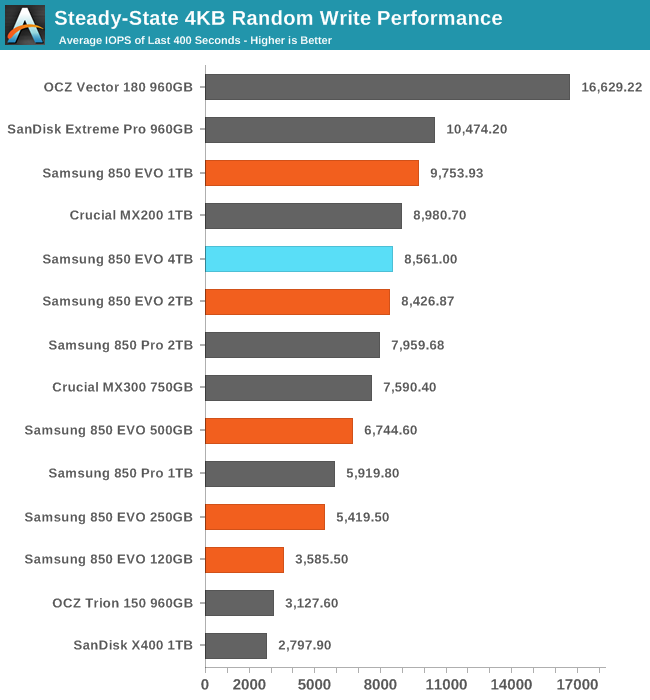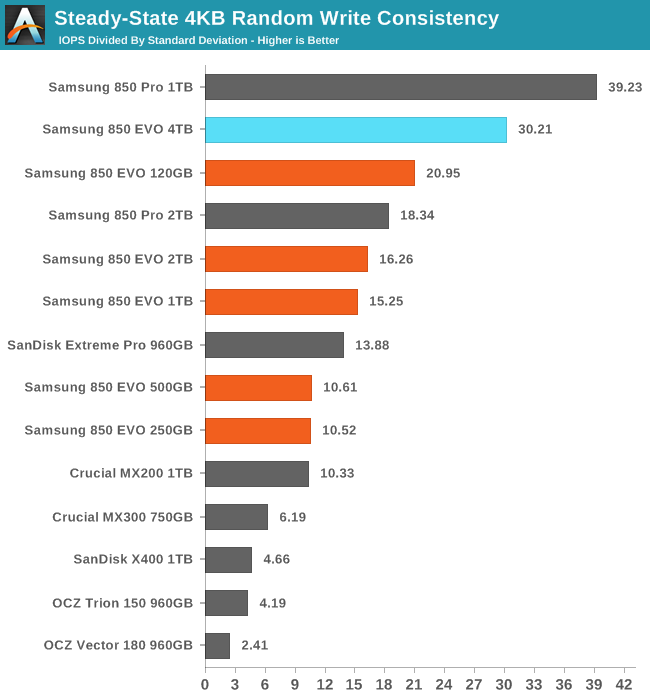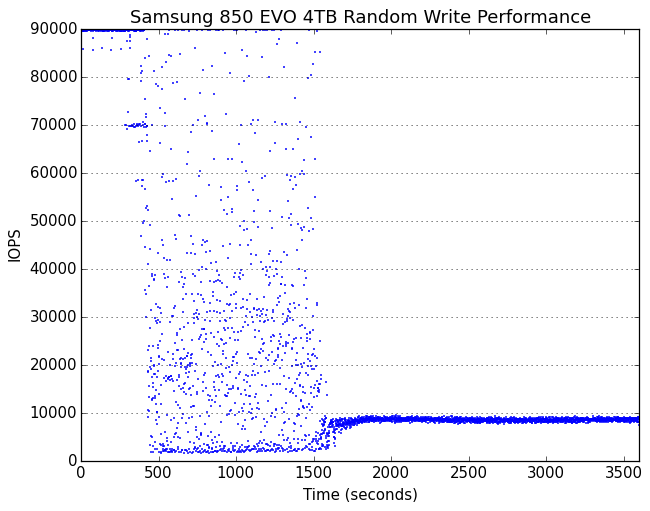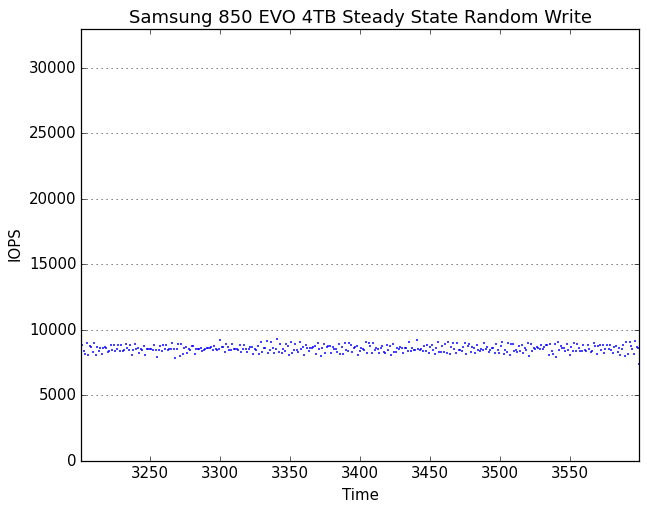The Samsung 850 EVO 4TB SSD Review
by Billy Tallis on July 11, 2016 10:00 AM ESTPerformance Consistency
Our performance consistency test explores the extent to which a drive can reliably sustain performance during a long-duration random write test. Specifications for consumer drives typically list peak performance numbers only attainable in ideal conditions. The performance in a worst-case scenario can be drastically different as over the course of a long test drives can run out of spare area, have to start performing garbage collection, and sometimes even reach power or thermal limits.
In addition to an overall decline in performance, a long test can show patterns in how performance varies on shorter timescales. Some drives will exhibit very little variance in performance from second to second, while others will show massive drops in performance during each garbage collection cycle but otherwise maintain good performance, and others show constantly wide variance. If a drive periodically slows to hard drive levels of performance, it may feel slow to use even if its overall average performance is very high.
To maximally stress the drive's controller and force it to perform garbage collection and wear leveling, this test conducts 4kB random writes with a queue depth of 32. The drive is filled before the start of the test, and the test duration is one hour. Any spare area will be exhausted early in the test and by the end of the hour even the largest drives with the most overprovisioning will have reached a steady state. We use the last 400 seconds of the test to score the drive both on steady-state average writes per second and on its performance divided by the standard deviation.

The 4TB 850 EVO restores a little bit of the performance that the 2TB lost relative to the 1TB, but Samsung's controller architecture is still clearly most comfortable at 1TB.

The consistency of the 2TB 850 EVO was only slightly better than the 1TB EVO, so it's surprising to see the 4TB model make such a large jump and come so close to the 1TB 850 Pro.
 |
|||||||||
| Default | |||||||||
| 25% Over-Provisioning | |||||||||
It is no surprise that a 4TB drive lasts so long before dropping out of peak performance: it has far more spare area to burn through than any ordinary consumer SATA SSD. The transition to steady state is uncharacteristically long and messy for a Samsung drive, and the performance lows during this period are disappointing. Once the drive has reached steady state, there's nothing to complain about.
 |
|||||||||
| Default | |||||||||
| 25% Over-Provisioning | |||||||||
There are no wild outliers from the 4TB 850 EVO's steady-state, and none of the longer-term drift in performance shown by the 1TB and 2TB 850 EVO and Pro models. With extra overprovisioning, the 4TB EVO carries on indefinitely with high and extremely steady performance.










145 Comments
View All Comments
Samus - Monday, July 11, 2016 - link
But you could buy 8TB of MLC-based Mushkin Reactor for the price of 4TB of 850 EVO. Then you consider a RAID of Reactors will be 4x the sequential performance of a 850 EVO.And let's face it, with a storage drive like a 4TB SSD, sequential performance is all that really matters unless you actually plan to use it as a boot/system drive.
ACE76 - Monday, July 11, 2016 - link
http://www.fudzilla.com/news/memory/39668-mushkin-...I can't wait for this...at $500 for 4tb, I'd move all my media over to SSDs in a RAID 10 array.
Ian Cutress - Tuesday, July 12, 2016 - link
We got clarification from Mushkin at the time when we posted similar: the $500 price point was actually a mischaracterization. The initial price would be much closer to $1000, with $500 being a goal nearer EOL.Oxford Guy - Monday, July 11, 2016 - link
How does TRIM fit into the picture of RAIDed ssds, though?Impulses - Tuesday, July 12, 2016 - link
TRIM has been working on RAID for a while, years actually, at least on Intel's newer chipsets... They kept it from older chipsets (like my old rig's P67) but enterprising users back ported it thru BIOS edits/hacks.Impulses - Tuesday, July 12, 2016 - link
Not that I'm against the EVOs, running 2x 1TB in RAID myself.bittermann - Monday, July 11, 2016 - link
Good luck fitting 4TB of data on that 1TB drive....Spoogie - Monday, July 11, 2016 - link
With Optane on the horizon, no reason to bite at this price point.Flunk - Monday, July 11, 2016 - link
I don't think it's the same market. Optane isn't going to be less than $1 a GB at the start.patrickjp93 - Monday, July 11, 2016 - link
65 cents/GB actually.